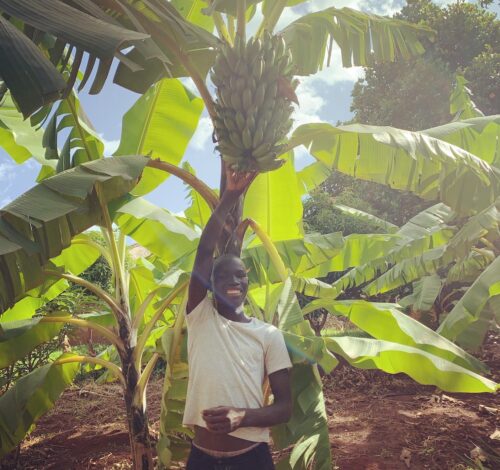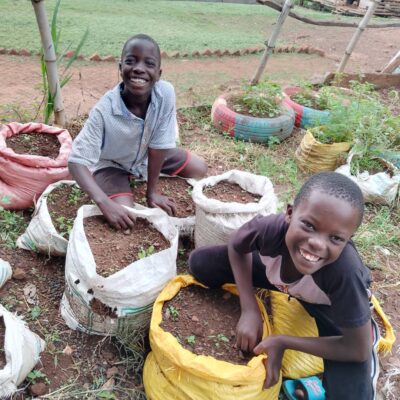Permaculture is a system of permanent agriculture, which encourages you to analyse the land and community around you to make the best use of the resources available. At our five acre site, we have our own demonstration permaculture farm which we use to educate the children staying at our Halfway Homes and Drug Rehabilitation Centre and give them new skills which will help them to be valued and accepted within their family once they are resettled home. We also invite interested members of their family to come and learn skills at our site too, especially if they are or want to run a farm as a business to support themselves.
We are happy to have been shortlisted for the Permaculture Magazine Prize for our work on Permaculture in 2018, 2019 and 2022.
Our Permaculture farm
In our permaculture demonstration farm, we grow a number of different crops which we use in our delicious meals for the children staying at our Halfway Homes and Drug Rehabilitation Centre.
These crops currently include
- matoke (a savoury banana)
- beans
- mangoes
- garlic
- herbs
- maize
- carrots
- potatoes
- greens
- tomatoes
- aubergine (or egg plants as they are known in Uganda) to name but a few
We also rear animals at our land, namely goats and chickens.

We believe that learning sustainable farming skills are vital for a world with an increasing population and changing climate.
Our farm helps children learn how you have to work together and come up with solutions to different challenges you face along the way. It also teaches the children that they can take action to combat climate change and live more sustainably with the planet.

Some of the topics we currently teach include:
- soil management and improvement
- companion planting
- natural pest management
- how to study and make the most of your available land
- terracing and A-frames
- water harvesting
- waste management and utilisation
- animal care
- farm design
- the benefits of bamboo
Through our ‘Growing for the Future’ programme, we provide permaculture training for young people who have previously lived on the streets and are undergoing rehabilitation at our Halfway Homes and Drug Rehabilitation Centre. Our training provides them with vital skills that will benefit them for life, supports their recovery from drug addiction and helps to re-build their self-confidence. It also gives our social workers the opportunity to build relationships with them in a less formal setting and helps prepare them to return to education. Once they are resettled, we provide them with seed packages so that they can share their new skills with their family and community members.
Through our Permaculture Business programme, we provide permaculture farming training and key business skills training to the families of children who we have resettled from the streets. Each family is supported by our permaculture farmers to map out their land based on the natural resources available and then provided with a start up package of seeds and tools that they can use to implement their learning. They receive regular follow ups, additional training and run peer to peer sessions with members of their community to share their knowledge and help others. Read more about our Family Business Empowerment programme here.
Check out our vegetable orchestra
Take a look at the incredibly talented children supported by S.A.L.V.E. who composed their own song and performed it with their very own vegetable orchestra!
The children wanted to do something different to highlight everything they have been learning about Permaculture sustainable farming (and how fun it can be), so they decided to use our demonstration farm to make a music video.
Thank you
We would like to thank everyone who has supported our Permaculture work so far. This programme is really helping both the children and their families to learn vital skills that will help them to have enough to eat, both now and in the future.
If you are able to offer help in growing this programme, please get in touch. We would love to hear from you.
